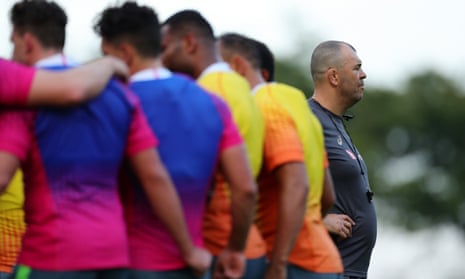Israel Folau will not be seen at the World Cup, but the presence of the former Wallabies’ star fullback is likely still to be felt in Japan. The player’s dramatic sacking for posting religiously-inspired homophobic comments on social media was arguably the greatest distraction that a national rugby team has ever endured and while the Wallabies say they have moved on, few Australian players would have been untouched by the furore one way or another.
Many of the Pacific Islanders in the squad would have been sympathetic towards Folau’s religious viewpoints, while others would have condemned his anti-gay comments. It was an issue that threatened to tear the Wallabies apart. Yet they seem to have managed the situation fairly well during the Rugby Championship and Bledisloe Cup series.
That does not mean Folau is completely out of the Wallabies’ thoughts. Coach Michael Cheika revealed on Saturday that he has been threatened and abused by angry fans over the player’s sacking, indicating the spectre of Folau was still hanging over the team. And if Folau was on the coach’s mind, it is probably safe to assume he was on the players’ minds as well, if only sub-consciously.
You could not blame a player for wondering whether the Wallabies would be a better team with Folau in it and whether they would have more chance of winning the World Cup, even if the thought was at the back of the mind. Fans have been asking themselves that very question; it is hard to imagine that you could take away a team’s most prolific try-scorer – Folau was the Wallabies’ fourth highest try-scorer in history with 32 tries in 62 Tests – without having some kind of effect.
There is still plenty of potency in the Wallabies’ back three with fullback Kurtley Beale and wingers Marika Koroibete and Reece Hodge, but none have the same strike power as Folau, who may well have thrived in the team’s new attacking system. With powerful inside-centre Samu Kerevi and big ball-carriers in the forwards getting across the advantage-line, Folau most likely would have been a greater threat than previously, when at times he struggled to get into the game. That would be a source of frustration for the Wallabies whether they wanted to admit it or not.
The Wallabies finished second in the Rugby Championship behind the Springboks and took a Test off the All Blacks in the Bledisloe Cup series, but no one will really know how much they miss Folau until the World Cup is underway. He under-performed at the 2015 World Cup in England because of a nagging ankle injury and the Wallabies would have anticipated a much bigger impact from him in Japan, almost a bonus.
Apart from his threat as a strike weapon, Folau was also the safest Wallaby player under the high ball with aerial skills that were second to none in world rugby. Beale can be susceptible to the high ball and teams are sure to employ the tactic against the Wallabies in Japan’s hot and humid conditions. The Wallabies’ other fullback option, Dane Haylett-Petty, is safe under the high ball, but lacks the attacking flair of Folau or Beale.
But Beale possesses attributes that Folau did not. While Folau was a supreme athlete, Beale is a more intuitive rugby player and brings playmaking skills to the fullback position, which have the potential to add more variety to the Wallabies’ attack. Beale can be lethal in attack as an individual, but he can also create opportunities for other players, a similar threat to the one posed by All Blacks five-eighth-cum-fullback Beauden Barrett. A super-sub at the 2015 World Cup, Beale needs to produce for the full 80 minutes as a starter in Japan to more than adequately replace Folau.
If the Wallabies perform disappointingly at the World Cup, Folau will become the biggest what-if story at the tournament, re-igniting debate over Rugby Australia’s handling of the issue. No one will ever really know for sure whether the Wallabies would have been better with Folau or not. But whether the Wallabies win the World Cup or not the threats and abuse over Folau’s sacking will most likely continue at least until the matter is resolved in court or quite possibly well beyond that. Folau may be gone, but he has not yet been forgotten.
